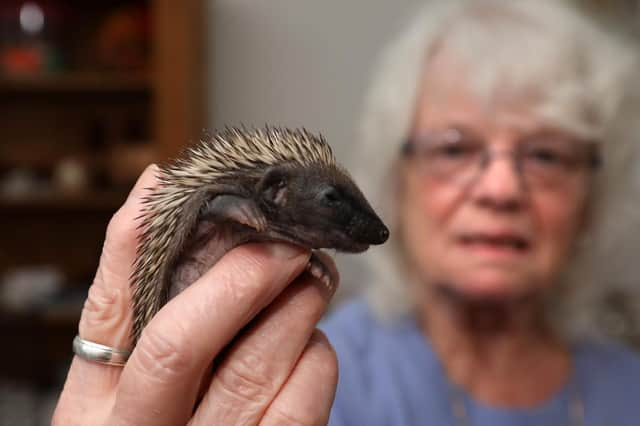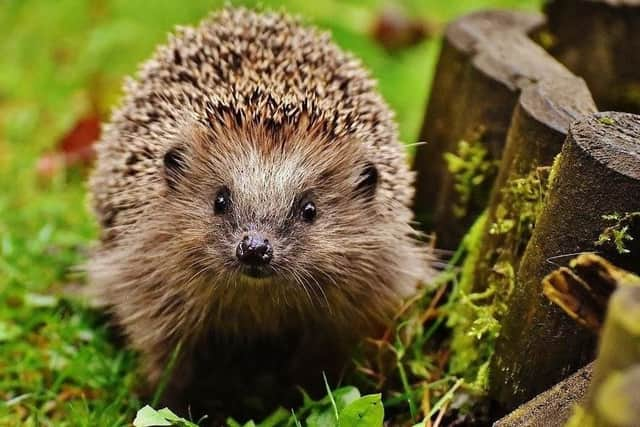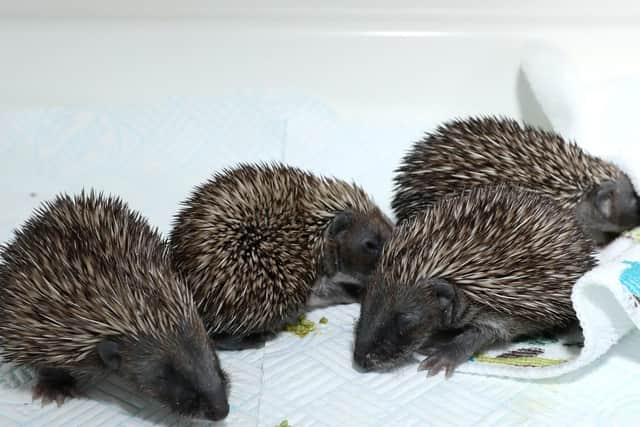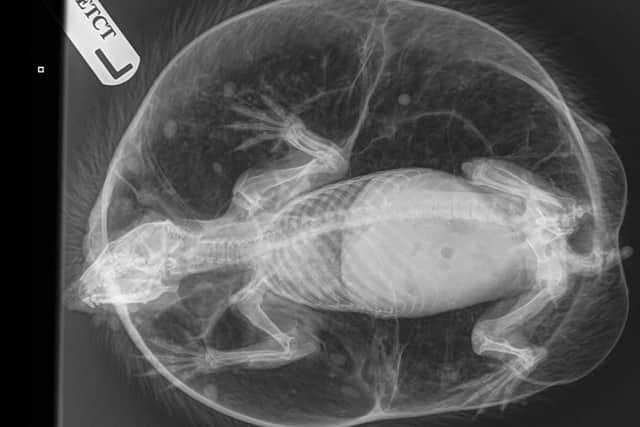Portsmouth women's crusade to save the hedgehog


Mrs Tiggy-Winkle would have thrown down her washing in horror to learn that her species might be about to snuffle off its mortal coil.
We've had a love affair with hedgehogs for centuries but especially since 1905 when Beatrix Potter turned industrious Mrs T into a bedtime must for generations of children.
Advertisement
Hide AdAdvertisement
Hide AdBut it's a sad fact, Britain has lost millions of hedgehogs in the past 65 years with numbers crashing from 36 million in the 1950s to fewer than a million today. Repeated surveys all tell the same story '“ we're on the verge of losing them for good if we don't help them fight back.Â


Two Portsmouth women who have dedicated their lives to the care and rehabilitation of hedgehogs worry that within 10 years these fascinating creatures, each with its own personality, may no longer be around.Â
Linda Hewett, 53, set up Bert's Hedgehog Retreat (the name was picked at random) seven years ago and is passionate about educating the public about hedgehogs and their plight.Â
She runs her Milton-based retreat with mum Pamela, and says: '˜People say they don't see hedgehogs around any more '“ not even dead on the road. Those lucky enough to have them in their gardens and feed them may never know how blessed they are, because the reality is they are in serious trouble.'Â
Advertisement
Hide AdAdvertisement
Hide AdLinda says there are many and complex reasons for the decline but almost all are down to humans. '˜Pesticides and poisons, bonfires, netting, roads, housing, litter, loss of habitat and fox, badger and dog attacks all play a part.'Â


'˜We work tirelessly to educate about how to make their environments better. I go to church groups, playgroups, visit Scouts and Guides and have given talks at the University of Portsmouth and Highbury College. I want younger generations to appreciate this iconic, at-risk animal is something they and their children may never see, and to be better guardians of their futures to ensure they don't become extinct.'Â
Bert's Hedgehog Retreat, in Locksway Road, can care for up to 32 baby, sick or injured hedgehogs at one time and relies on donations. It takes them from as far as Alton and calls for advice come from France. The retreat is in Linda and Pamela's home, plus two garden sheds.Â
Linda, who is registered with the British Hedgehog Preservation Society and also works full-time in a care home, adds: '˜We rehabilitate and release as many hedgehogs back to the wild as possible. Where not possible, if injured or disabled, we release them into an enclosed, secure garden.Â
Advertisement
Hide AdAdvertisement
Hide Ad'˜We are a not-for-profit rescue and can't run without donations. We rely on our supporters to keep us afloat. They've helped us buy a new shed, cages and an incubator. We have volunteer drivers and foster carers who donate their time and people who fundraise for us. People drop off food and essentials for us weekly. Â


'˜There are times I've paid for vet care myself. Wildlife is not treated for free '“ most will give a small discount or they charge full price.Â
'˜Any hedgehog out in the day, wobbling, falling over, lying out flat or dragging a limb, or with flies buzzing around it, needs help. Pick it up with a towel, put it in a secure box, keep it warm, and get help immediately. If you disturb a nest cover it back up and listen for high-pitched squeaking in case the mother abandons it.'Â
They mate between April and September, but mainly in May and June. Hoglets are born in June and July. Hibernation usually takes place between November and mid-March, but is weather-dependent and in mild years hedgehogs have been active in December. Â
Advertisement
Hide AdAdvertisement
Hide AdLinda's mother, Pamela, 72, loves watching a sick or injured hedgehog leaving in good health. '˜Our day starts at 4am, Linda gets up, cleans the cages out and feeds the hedgehogs. We make up milk for the babies we're weening which have to be fed every two-to-three hours. We have some in our incubator which is the same temperature as it would be under a mummy hedgehog.
'˜They're here because they were found on a construction site and were near death when they came in.  We have to feed them with teats and rub their tummies with Vaseline and a cotton bud so they can go to toilet. Their mothers would usually help them go.Â
'We decide whether they need to go to the vet. We can treat them here because we've got a little hospital set-up, but for anything major they go to a vet. We can give them pain relief and fluid which is inserted into their backs if they're really dehydrated.' Â
The retreat needs items including medication, cleaning products and equipment, wet and dry cat food, in particular chicken-flavoured biscuits, wet dog food and mealworms to name a few.Â
Advertisement
Hide AdAdvertisement
Hide Ad'˜Sometimes we get no calls a day, sometimes five,' she adds. '˜I always pick up. We do this 24/7'“ people tell me they can't get hold of anyone else at evenings or weekends.Â
'˜We looked after one we called Clementine which had balloon syndrome after it had been to the vet.  An injury inside, it can be a fracture or a little cut. Gas is trapped under the skin and the hedgehog blows up like a balloon.
'˜Time is of the essence. There are some that could have survived if they got help sooner. People should act straight away.' Â
'¢Â Bert's Hedgehog Retreat is at 4 Locksway Road, Milton, Portsmouth. Donations can be made in person or given via its GoFundMe page or directly by PayPal to Linda. Contact the retreat for more details. Call 07776 231 904 to report a sick or injured hedgehog.Â
What to do if you find a sick or injured hedgehog
Advertisement
Hide AdAdvertisement
Hide Ad'¢Â If a hedgehog is out during the day, wobbling, falling over or circling, it needs helpÂ
'¢Â Carefully put it in a deep, secure box
'¢Â Provide food, water and warmth '“ either through a well-wrapped hot water bottle or blanket (don't use boiling water)
'¢Â  If you only have a shallow box, put something over the top and weigh it down '“ they can escape easily
'¢Â Monitor the situation while calling for immediate helpÂ
'¢Â Call Bert's Hedgehog Retreat on 07776 231 904Â
Advertisement
Hide AdAdvertisement
Hide Ad'¢Â Or Call Hayling Island Hedgehog Rescue on 07976 532 960
'¢Â Or Little Prickles in Fareham on (023) 9232 8197 Â
'¢Â You can also call the RSPCA's 24-hour cruelty and advice line on 0300 1234 999
'¢Â Visit hedgehogstreet.orgÂ
The RSPCA has issued guidance on how you can make your garden safer and more appealing to hedgehogs.Â
Hedgehog corridors: Hedgehogs travel on average one mile a day but can be impeded by walls and fences. Use fencing with gaps, remove a brick from a wall, cut a hole in your fence or dig a tunnel underneath Gardening: Leave '˜wild' insect-friendly areas to encourage invertebrates for hedgehogs to eat and provide shelter for them. Check for animals before mowing or strimming your lawn and take care when turning over compost or leaf piles with a spade or pitchfork Log, compost or leaf piles: All provide shelter for nesting mothers, young hoglets and hibernating hedgehogs  Bonfires: Always thoroughly disturb bonfires before lighting, as there could be hedgehogs nesting or hiding inside. Netting: Ensure any netting in your garden is well above ground level as hedgehogs can easily get caught in it. Pack away fruit nets, tennis and goal nets when not in use Drains and holes: Hedgehogs can fall into uncovered drains or holes. Cover or check them every day to ensure none has got trapped Litter: Litter can trap, injure or choke animals. Clear it out of your gardenGarden chemicals: Pesticides reduce the prey available to hedgehogs. Slug pellets can poison them.Try natural alternatives like crushed eggshell or coffee grounds.Â
Sheds: Don't close shed doors if you usually keep them open, there may be hedgehogs nesting in there.